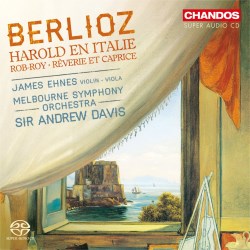
|
Hector BERLIOZ (1803-1869)
Intrata di Rob-Roy Mac Gregor (1831) [13:16]
RÍverie and Caprice, Op.8 (1841) [8.07]
Harold in Italy, Op.16 (1834) [42.16]
James Ehnes (violin/viola)
Melbourne Symphony Orchestra/Sir Andrew Davis
rec. 2014, Hamer Hall, Arts Centre, Melbourne, Australia. DDD
CHANDOS CHSA5155 SACD [64:00]
I fear that as much as I have admired him in other works, I have never found Andrew Davis to be a very impassioned or idiomatic conductor of Berlioz, and this recording runs to form.
It is “correct” and unobjectionable, but comparisons with other more established recordings of the main work here reveal a lack of torque and intensity at key moments. Take the first brass outburst at 1:50, repeated, preferably with even more gusto, at 2:10 after the growling ostinato in the lower strings with which “Harold in Italy” opens. Similarly, the end of the work comes across as rather tame compared with the whirlwind abandon of Ormandy’s classic 1965 recording. The Melbourne Symphony Orchestra is a fine outfit but hardly the equal of the Philadelphians of that era in full swing.
The gifted soloist on two instruments is clearly a fine musician but he, too, sounds just a little placid. The recording itself does not help: it is rounded, with a deep bass response, but most of the edge in the treble is smoothed out.
The two supporting works are of interest to Berliozians in that the first was destroyed by Berlioz as “long and diffuse” – and I tend to agree with him that its duration outlasts his invention. The jolly Scottish themes are lively and fun but this is not top-drawer Berlioz. A copy survived but Berliioz had within a year incorporated its two main themes into “Harold”. Berlioz, like Handel, Rossini and many a good composer before him, had no qualms about recycling a good tune, so in “Reverie et caprice” we hear the music formerly found in an aria for Teresa in “Benvenuto Cellini” but transposed for violin. Again, it is not Berlioz at his best but it displays his trademark sudden rhythmic switches and bursts of orchestral hyperactivity. It affords considerable pleasure played this well.
Not an essential issue then, even for committed adherents of Berlioz like me.
Ralph Moore
 |
 |
|



 All Nimbus reviews
All Nimbus reviews








